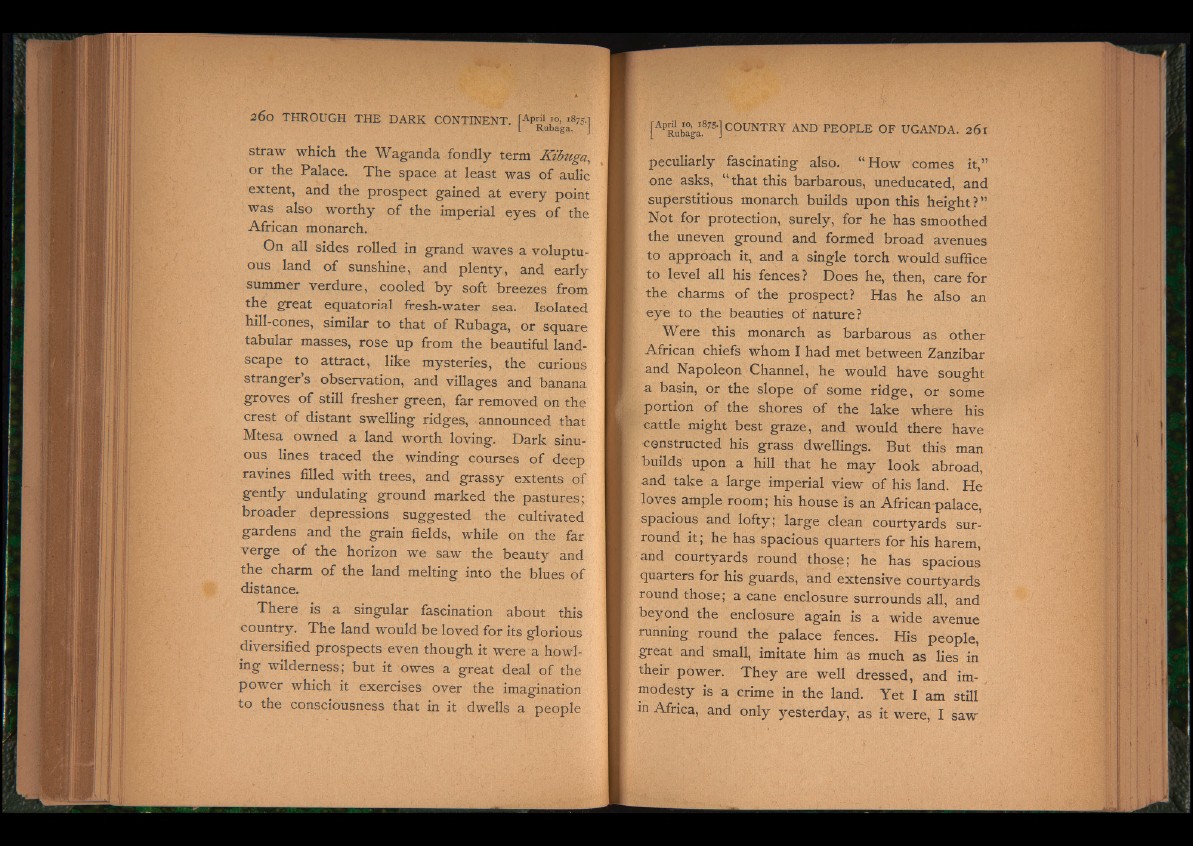
straw which the Waganda fondly term Kzbuga,
or the Palace. T h e space at least was o f aulic
extent, and the prospect gained at every point
was also worthy o f the imperial eyes o f the
African monarch.
On all sides rolled in grand waves a voluptuous
land o f sunshine, and plenty, and early
summer verdure, cooled b y soft breezes from
the great equatorial fresh-water sea. Isolated
hill-cones, similar to that o f Rubaga, or square
tabular masses, rose up from the beautiful landscape
to attract, like mysteries, the curious
stranger’s observation, and villages and banana
groves o f still fresher green, far removed on the
crest o f distant swelling ridges, announced that
Mtesa owned a land worth loving. Dark sinuous
lines traced the winding courses o f deep
ravines filled with trees, and grassy extents o f
g en tly undulating ground marked the pastures;
broader depressions suggested the cultivated
gardens and the grain fields, while on the far
v e rg e o f the horizon we saw the beauty and
the charm o f the land melting into the blues o f
distance.
There is a singular fascination about this
country. T he land would be loved for its glorious
diversified prospects even though it were a howling
wilderness; but it owes a great deal o f the
pow e r which it exercises over the imagination
to the consciousness that in it dwells a people
[ ApR u b a g a87S' ] G O U N T R Y AND PEOPLE OF UGANDA. 261
peculiarly fascinating also. “ How comes it,”
one asks, “ that this barbarous, uneducated, a n d
superstitious monarch builds upon this he igh t?”
Not for protection, surely, for he has smoothed
the uneven ground and formed broad avenues
to approach it, and a single torch would suffice
to level all his fences ? Does he, then, care for
the charms o f the prospect? Has he also an
e y e to the beauties o f nature?
Were this monarch as barbarous as other
African chiefs whom I had met between Zanzibar
and Napoleon Channel, he would have sought
a basin, or the slope o f some rid g e , or some
portion o f the shores o f the lake where his
•cattle might best graze, and would there have
constructed his grass dwellings. But this man
builds upon a hill that he may lo o k abroad,
and take a large imperial view o f his land. He
loves ample room; his house is an African palace,
spacious and lofty; large clean courtyards surround
it; he has spacious quarters for his harem,
and courtyards round those; he has spacious
quarters for his guards, and extensive courtyards
round those; a cane enclosure surrounds all, and
beyond the enclosure again is a wide avenue
running round the palace fences. His people,
great and small, imitate him as much as lies in
their power. T h e y are well dressed, and immodesty
is a crime in the land. Y e t I am still
in Africa, and only yesterday, as it were, I saw